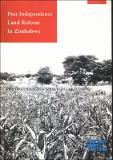| dc.contributor.author | Marongwe, Nelson | |
| dc.coverage.spatial | Zimbabwe. | en |
| dc.date.accessioned | 2016-03-21T14:13:29Z | |
| dc.date.available | 2016-03-21T14:13:29Z | |
| dc.date.issued | 2004 | |
| dc.identifier.citation | Marongwe, N. (2004) Socio-economic conflicts of the fast track resettlement programme. In: Masiiwa, M. (ed.) Post-independence land reform in Zimbabwe: controversies and impact on the economy. Harare: Friedrich Ebert Stiftung and Institute of Development Studies, University of Zimbabwe, pp. 25-35. | en |
| dc.identifier.isbn | 0797427864 | |
| dc.identifier.uri | https://opendocs.ids.ac.uk/opendocs/handle/20.500.12413/10190 | |
| dc.description | A paper highlighting the negative effects on the economy of the Zimbabwe government's "fast track land re-distribution programme." | en |
| dc.description.abstract | Fast track resettlement has contributed immensely to the events leading to the current poor state of the economy. Business and investor confidence has been severely eroded since the adoption of fast track. Perceptions and interpretations on the rule of law concept and the non-observance of property rights are at the centre of the effects of fast-track resettlement on the state of the economy. For example, according to the Zimbabwe National Chamber of Commerce (ZNCC), "— private property rights — form one of the central pillars of private enterprise development and also ensure security of tenure of investment in the eyes of both domestic and foreign investors. Further to this, the internal and external concerns about the observance of the rule of law as evidenced by non-observance of some court judgements have also been largely attributed to the state of the economy”. Agriculture has generally been one of the most badly affected sectors. Yet it is undisputed that agriculture is the mainstay of Zimbabwe’s economy and all other sectors are strongly linked to agriculture. For instance, manufacturing absorbs about 60% of agricultural output and 20% of mining input (ZNCC 2002). The disruption of agricultural production translate into a decline by the manufacturing sector, with the ZNNC estimating that industrial capacity has deteriorated to below 1970 levels. | en |
| dc.language.iso | en | en |
| dc.publisher | Friedrich Ebert Stiftung and Institute of Development Studies, University of Zimbabwe, Harare, | en |
| dc.rights.uri | http://creativecommons.org/licenses/by-nc-nd/3.0/ | en |
| dc.subject | Economic Development | en |
| dc.subject | Politics and Power | en |
| dc.title | Socio-economic conflicts of the fast track resettlement programme | en |
| dc.type | Book chapter | en |
| dc.rights.holder | © This collection: Medicine Masiiwa, Friedrich Ebert Stiftung and Institute of Development Studies, University of Zimbabwe | en |


